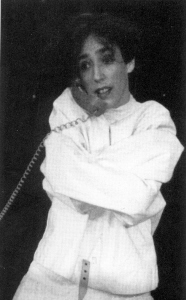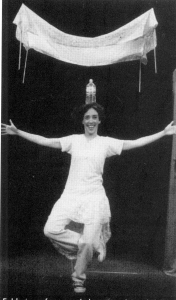
Felder tells a story of courtship in a straightjacket (Photo by Gene Dugan, Out North Theatre) |

Felder's performance balances traditional skills and a modern love story (Photo by Gene Dugan, Out North Theatre) |
Page 34 Spring 1995
|
Felder's
New Show Creates Empathy
For Modern-Day Traditions
By
Jim Kerr
Tradition
meets juggling. Juggling meets lesbianism. Lesbianism meets tradition. Tradition
meets reality. Meet Sara Felder.
Sara
bills herself as a "juggling monologist." She has been
juggling ever since meeting Edward Jackman in an honors math class
while attending UCLA and taking a juggling lesson from him. At the
time her perception of jugglers was skewed by the likes of her teacher
and his friends (such as Peter Davison), who could all juggle seven
balls. She thought that was what all jugglers did.
Although
now Sara does some impressive juggling, she uses it mainly to tell a
story, as opposed to juggling as an end in of itself. The monologue is
the thread that weaves the "June Bride" story together.
However, it's the juggling that pulls the threads taught, that keeps
the story engaging and demands your attention. Sara has up to now let
the words come after the juggling. In "June Bride," however,
words come first and the juggling next.
Sara
establishes herself as a juggler and lesbian with two routines. First
a brief shtick in which she puts on lipstick without a mirror and
explains how she would rather be at the "Lesbians for
Lipstick" meeting. Next is a delightful ball juggling performance
during which Sara explains the problems associated with being a
juggler and how jugglers are so different. Fortunately for her she
discovered San Francisco where people juggle openly in the public
without fear of who they are. Despite the more tolerant attitude of
people there she still has fears of persecution. The routine is, of
course, a clever allegory to lesbianism.
Thus,
with a basic three ball routine Sara has raised the consciousness of
her audience concerning lesbianism and at the same time charmed and
entertained them.
The
use of objects play a large role in crafting Sara's piece. Her set
design is composed of props hanging quite naturally from two walls
covered with cloth. Between the two walls hangs the chuppa, a
canopy under which Jewish weddings take place. Her access to the props
is natural and the props were quite aesthetically arranged in Out
Nor1h's small theater. I might add that the coziness of the theater
contributed greatly to the impact of the show in two significant ways:
you could hear her unamplified voice quite well; and you could see her
visual work up close. There was little toss juggling in the show. Sara
attempts to milk character and even dialog out of the tools of her
trade. For example, to symbolize tradition she uses a violin, which
she holds upside down and talks to about various dilemmas throughout
her story. It is easy to see the similarities between an upside-down
violin and the face of an elderly traditional Jewish man. Eventually
she does balance the "old man" (the violin) on her chin.
Songwriters
write love songs all the time. Why don't jugglers write love juggling
pieces? Sara uses graceful contact juggling and poetry to express her
love for Dev. I don't know if she is the first to create such a
wonderful concept, but I hope. she's not the last. A love performance
piece - A love juggling piece? A lovecontact-juggling piece?
Whatever it is, I wish
Poetry
meets circumcision when Sara juggles three knives and recites a poem
on the Jewish tradition of circumcision. Here again, an appropriate
selection of props keep the piece from getting too heavy - and the
audience certainly got the point (pun intended).
Sara
uses juggling and charm to take her story to people who would
otherwise have very little interest in it. After attending the show I
felt that I had learned a great deal about the Jewish culture and
lesbianism from a very day-to-day perspective. It is this kind of
perspective that inspires empathy between cultures and peoples. In
this respect her juggling has made "June Bride" accessible
to the Sara
Felder will present "June Bride" May 10 at the Womens
Theatre Festival in Philadelphia at the Ashkenaze Festival of Yiddish
Culture in Toronto; and July 14-15 at the Mad River Summer Festival in
Blue Lake, Calif.. |

Felder tells a story of courtship in a straightjacket (Photo by Gene Dugan, Out North Theatre) |

Felder's performance balances traditional skills and a modern love story (Photo by Gene Dugan, Out North Theatre) |